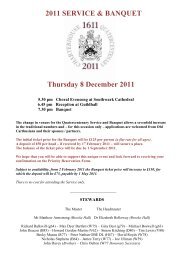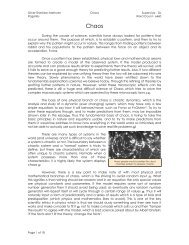Nationalism and Racism: Their Relationship and ... - Charterhouse
Nationalism and Racism: Their Relationship and ... - Charterhouse
Nationalism and Racism: Their Relationship and ... - Charterhouse
You also want an ePaper? Increase the reach of your titles
YUMPU automatically turns print PDFs into web optimized ePapers that Google loves.
Charlie Peirson 24 Aug. 10<br />
In a sense racism needs a political context or background to become relevant <strong>and</strong> such<br />
a context was provided at the correct time with the development of nationalism,<br />
another result of modernity. The French philosopher Etienner Balibar stated that there<br />
was a relationship of "reciprocal determination" between the two ideologies, meaning<br />
they were not the same but instead served to support each other.<br />
In order to fully underst<strong>and</strong> <strong>and</strong> analyze their relationship it is necessary to explore<br />
both the progression of racial theories <strong>and</strong> the political atmosphere, in which they<br />
were received, which ultimately led to racist ideas being integrated into the practices<br />
of nation-states. The word 'race' was first used in its current meaning by Francois<br />
Bernier in an essay in 1684 in which he posited that the term 'race' referred to<br />
observable physical differences in human beings. This essay was made possible in a<br />
time when academics began to shift to "more logical description <strong>and</strong> classifications<br />
that ordered humankind in terms of physiological <strong>and</strong> mental criteria based on<br />
observable 'facts' <strong>and</strong> tested evidence" 18 as opposed to the somewhat metaphysical<br />
theories that presupposed this mode of thought. At the time of Enlightenment, it must<br />
be noted that these divisions of race had no ideas of hierarchy about them as of yet.<br />
Contrastingly, these early theories of race actually upheld the idea of monogenesis:<br />
the belief that all human beings originally descended from one group. This was<br />
supported by the Bible's account of Creation <strong>and</strong> the values of equality <strong>and</strong><br />
brotherhood that rose out of the French revolution <strong>and</strong> the Enlightenment. Physical<br />
anthropologists at the time, such as Blumenbach, adopting this idea of monogenesis,<br />
believed that this original human race was white-skinned <strong>and</strong> all "non-white races<br />
were understood to have 'degenerated' over time due to climate, disease, <strong>and</strong> way of<br />
18 Hannaford, 1996, P187<br />
6
















